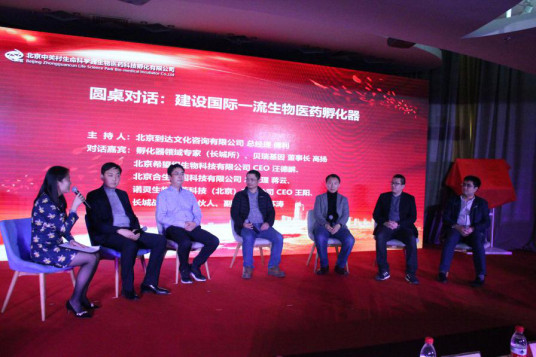Zhongguancun Life Science Park is striving to build a world-class biomedical incubator
During the recently held development forum of biomedical enterprises, a round-table dialogue with the theme of "Building a world-class biomedical incubator" was launched.
 |
|
Representatives of renowned enterprises and industry experts actively engage in discussions. [Photo provided to chinadaily.com.cn] |
In the past 15 years, the incubator of Zhongguancun Life Science Park has insisted on creating better "innovation ecology" and providing high-quality software and hardware services for entrepreneurs. It has successfully attracted over 200 high-tech biomedical industries to settle in and cultivate 10 listed companies, with the success rate of 80 percent.
In September 2018, the "Action Plan of the Beijing Municipal Government on Accelerating Medical and Health Collaborative Innovation (2018-2020)" was released. The plan proposed that Beijing biomedical industry should strengthen its incubating capacity and build some professional incubators in the life science park.
Against this backdrop, the incubator of the Zhongguancun Life Science Park will face new development opportunities. How to maintain original advantages and continue to improve the innovation ecology? The incubator invited representatives of renowned enterprises and industry experts to discuss how to build the incubator into a world-class one and how to better serve enterprises.
Li Yiping, general manager of Biomedical Technology Incubation Corporation of Beijing Zhongguancun Life Science Park noted, before enterprises entering the incubator, the incubator will remind entrepreneurs of the threshold of the biomedical industry. Since this industry is different from cultural creativity, TMT and other industries, entrepreneurs should fully consider such factors as the cost of entrepreneurship, investment cycle, risk and stress.
Gao Yang, chairman of Beijing Berry Genomics, said that the incubator of the Zhongguancun Life Science Park serves as a bridge between enterprises and the government; it can provide advice and suggestions for relevant government departments on behalf of enterprises. Meanwhile, the incubator should strengthen the promotion and implementation of preferential policies to enterprises, so that more companies can learn and benefit from the policies.
Wang Depeng, CEO of Beijing Hope Group Biotechnology remarked, for the gene sequencing industry, enterprises need to process massive amounts of data, which requires us to possess particularly large computing power and a strong ability to transmit such data.
"Incubators and the Zhongguancun Life Park have built huge biological data servers for the enterprises entering the park. However, if a world-class biomedical incubator is to be built, such data storage and transmission capabilities may still need to be further improved in the future." Wang noted.
Wang Yang, CEO and chairman of Nuoling Biomedical Technology stated, "from the perspective of Beijing's industrial development and urban development orientation, some industries are not allowed to carry out large-scale production. However, if production bases of some companies can be set up in the suburban area or Hebei province, it will facilitate those R&D pharmaceutical enterprises to cooperate and build a complete pharmaceutical industry chain."
Jiang Yun, general manager of Hesheng Gene Technology mentioned, if the industrial layout of synthetic bio-industry in the future should focus on two points: international cooperation and the strengthening of industrialization.
Finally, Xu Sutao, deputy general manager of Greatwall Strategy Consultants provided some suggestions on how to build a better life park incubator.
The first is to grasp the current trend and opportunity of entrepreneurial incubation; the second is to more accurately position high-end entrepreneurship; the third is internationalization and the improvement of innovation ecology, for the incubator will eventually form a super ecology; fourth, the pre-incubator should be strengthened to discover more original technologies; the last, to explore the reverse incubation, and allocate innovation resources from the direction of industrialization of commercial application.
